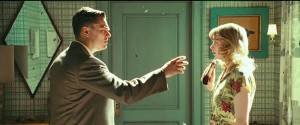Martin Scorsese is known as an auteur with a signature style. Shutter Island may be a genre picture, but it is a completely new aesthetic for Scorsese.
The movie takes place on an island of no escape and this claustrophobic atmosphere is reminiscent of the director’s “man in a room” movies such as Taxi Driver and Bringing Out The Dead. And there are stylistic links to classic film noir and the American masters of the director’s youth. Films like T-Men and Shock Corridor (playing at the Film Forum April 30) come to mind. These are expected reference points from Scorsese, whose encyclopedia knowledge of classic American cinema is often evident in his own work , however they’re handled completely differently here as stylistic cousins rather than direct references.
While the classic noir narrative is at work, Shutter Island also has a dreamlike quality to it that likens it more to a contemporary European aesthetic. The way reality bleeds into fantasy through time-shifting nightmarish, hallucinatory flashbacks, brings to mind something more like The Diving Bell And The Butterfly or La Vie En Rose. Interestingly, the contemporary European and the classic noir aesthetic both have distinct perspectives on World War II and this Dennis Lehane adaptation with the trauma of war at its core somehow incorporates both of these perspectives. There’s also an element of the what’s-going-on layered twists increasing popular in thrillers post-Sixth Sense, and it is perfectly applied here.
I stood in line for the movie with what was basically the Jersey Shore cast, so I expected, as is the norm for movies in my local multiplex, the yells at the screen to only be paused long enough to send and receive texts, but the audience was completely silent, riveted the entire time.
This is what Scorsese has done for years – entertain audiences while providing something intellectually challenging and with great visual and thematic depth. Shutter Island, a film I would not likely have known to be by the filmmaker or his regular crew, including editor Thelma Schoonmaker and cinematographer Robert Richardson. It is proof that Scorsese has new ways of doing what he has always done so masterfully.

